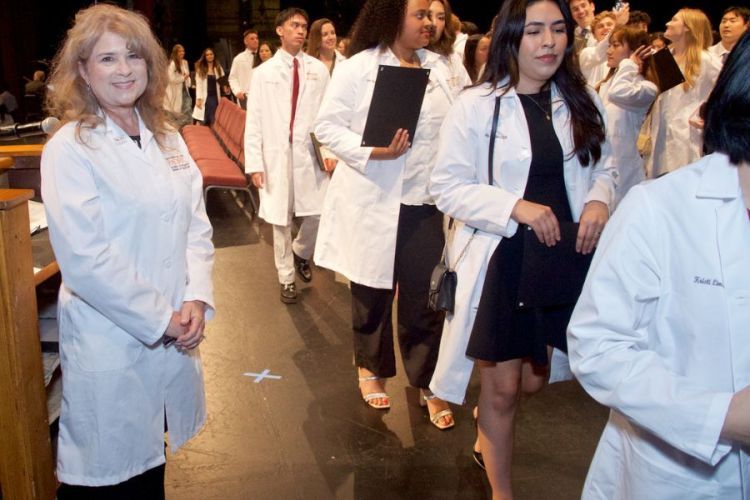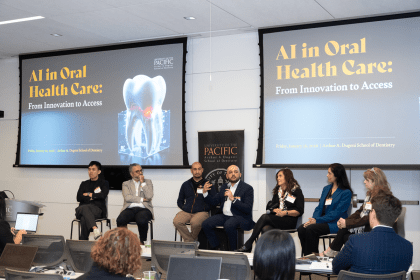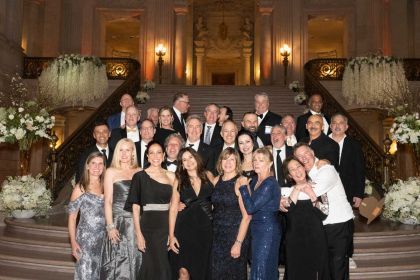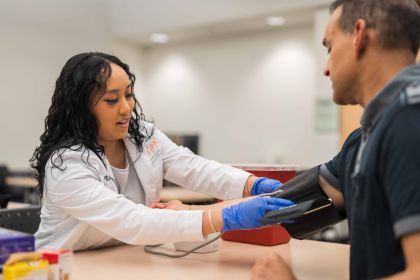Breadcrumb
Conversation with Dr. Elisa Chavez

Dr. Elisa Chávez, interim dean of the Arthur A. Dugoni School of Dentistry at University of the Pacific, has built her career bridging education, innovation and advocacy.
From directing hospital-based dental programs to championing seniors’ oral health nationwide, Chávez brings decades of experience to her role at Pacific.
She shares how she found her calling, what drives her as an educator and why dentistry’s future is as much about leadership as it is about clinical skill.
Why did you initially get into the field?
There were three dentists who took the time to take me under their wing and tell what a great profession dentistry was for them and could be for me. The first was a college friend's dad who was a dentist and put the first idea in my head. The second knew my mom and heard I was thinking about dentistry and took me to lunch every time I came home from college to encourage me and give me advice. The third who sealed the deal was my own dentist who let me shadow him in his practice.
What do you love about dentistry?
At chairside, what I love is seeing function and confidence restored. In the big picture, I love the versatility of the profession, which is not always obvious to most people or even when you are starting out.
What is special about the Arthur A. Dugoni School of Dentistry?
There is a real sense of possibility and promise that lives here. Promise and belief in the individual and collectively as a profession, a school and a university. I think that is where the drive for innovation and excellence comes from that I have observed to be a constant theme in the 25 years I have been with the dental school.
Why is advocating for the oral health needs of seniors important to you?
My grandfather was the first person who told me we could keep our teeth for a lifetime. He was not a dentist; he learned this from an army dentist. He would have been 115 years old this year, so this is not new information.
Ageism and societal neglect of oral health has led us to believe that it is expected and even okay if oral health declines as we get older, that dentistry is nice if you can afford it but not necessary. And yet we know that poor oral health and untreated oral diseases have negative consequences for health and well-being. The frustrating part is that most oral diseases are highly preventable. Many older adults do have unique risks to their oral health that we can address, but many lack the knowledge about those risks and the financial resources for the preventive and restorative care they need.
How would you describe your leadership style?
I think it would be pragmatic. Things need to get done so we need to figure it out.
Why is leadership an important quality for dentists?
We are privileged to have the education we have had, and people do look to us a leaders and role models, whether or not that was our intention when we started out. Whether you are a practice owner, a clinic director or part of the dental staff in a clinic, a hospital, an academic setting or engaged in organized dentistry, you will be leading a team at some point.
What is the most rewarding part of your job?
As a dental educator, I love to the see the “aha” moment. When students make the connection with what you have been telling them in class while they are caring for a patient, and they understand their role in that—that is the absolute best.
What has been rewarding about your time as interim dean?
I have really been inspired by the drive I have seen in students, faculty, staff and alumni to preserve what is special about our school and yet to move forward, to maintain our momentum and to embrace what will come next.
How does Pacific prepare confident and capable dentists?
The Dugoni School has always prepared students to be amazing clinicians and encouraged them to develop their leadership abilities as well. We are also committed to teaching them to be lifelong learners. Health care has and is rapidly changing. We have to help our students develop their capacity and ability to adapt to those changes, and part of that comes from modeling that in our programs.
What advice would you have for someone who was thinking about entering the field?
Do your homework. Learn what is required to get into and through school. Spend time, whether volunteering or working in a dental practice or community health clinic to see what happens day to day. To be honest you won't really know what to expect from school or the profession until you are in it. But once you are in it, even when it is challenging, it won't feel like a chore or a job, it will feel like work you must do.





